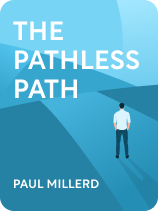

This article is an excerpt from the Shortform book guide to "The Pathless Path" by Paul Millerd. Shortform has the world's best summaries and analyses of books you should be reading.
Like this article? Sign up for a free trial here.
Have you followed a traditional career path? Would you like to exercise more freedom in work and life?
Paul Millerd abandoned a conventional career and became a freelancer. In his book The Pathless Path: Imagining a New Story for Work and Life, he shows others how to do the same. He relates the history of the cultural emphasis on work, shares his own story, and provides advice for switching to freelancing.
Continue reading for an overview of this book that could inspire you to take a new path.
Overview of The Pathless Path: Imagining a New Story for Work and Life
The Pathless Path: Imagining a New Story for Work and Life, published in 2022, encapsulates Paul Millerd’s non-traditional approach to career success and happiness. Millerd is a freelance blogger, business consultant, career coach, and online course creator. But, he didn’t start out that way—like most people, he was taught to place conventional, full-time work at the center of his life, and he did so for many years until he realized how unhappy it made him. He argues that the traditional approach to work inevitably makes people miserable, so he encourages you to leave it behind, deprioritize work, and pursue a meaningful, creative life instead. He offers several tips based on his experience for transitioning to the more autonomous world of self-employment.
We’ll explore Millerd’s ideas in three parts:
- In The History of Prioritizing Work, we’ll explain how work came to be so central to people’s lives, explore the negative consequences of prioritizing work, and discuss an alternative to traditional full-time work: freelancing.
- In Millerd’s Shift in Priorities, we’ll explain how and why Millerd rejected the traditional approach to work and switched to freelancing instead.
- In How to Deprioritize Work, we’ll discuss some of Millerd’s tips for breaking free of the job that makes you miserable and pursuing something more fulfilling.
The History of Prioritizing Work
Before we jump into Millerd’s non-traditional approach to work, we’ll discuss the traditional approach to work. First, we’ll explain the historical events that made it popular to prioritize work ahead of everything else. Then, we’ll explain the negative consequences of prioritizing work and explore an alternative: freelancing.
How Work Became Everyone’s First Priority
Millerd explains that historically, most people understood work as something you must do to survive and believed that once your needs are met, it’s OK to stop working. However, during the Protestant Reformation, Martin Luther and John Calvin introduced a new idea—that everyone had a God-given purpose and that working hard to fulfill this purpose would bring you closer to God. Millerd says that, according to sociologist Max Weber in The Protestant Ethic and The Spirit of Capitalism, this sparked a major cultural change in the West with long-lasting effects on the way people approach work: In capitalist countries, work became the first priority in most people’s lives.
Events That Deepened the Emphasis on Work
Millerd also points to three historic events that deepened the emphasis on work in US culture: First, after World War II, the US experienced an economic boom that enabled the average person to buy a house, support their family, and build unprecedented wealth just by working a full-time industry job until they reached retirement age. (This was a drastic change—before the war, most people supported themselves through subsistence farming.)
According to Millerd, most people continue to believe that this is the way things are supposed to be—but he explains that this was an exceptional event in world history and that economic circumstances have changed vastly since then, which means that trying to replicate this way of life is futile.
Second, these postwar economic changes led to a widespread change in American culture: For the first time, you would only be seen as a legitimate member of society if you worked a full-time job. The government even codified this opinion into law in 1946, when Congress passed the Full Employment Act, which mandated that the federal government do everything in its power to ensure every American was employed full time. Millerd says that, according to anthropologist David Graeber in Bullshit Jobs, this made it necessary for useless jobs—which don’t have an intrinsic value and entail wasting time for most of the day—to be created and kept, even though most workers hate these kinds of jobs.
Third, Millerd says that, beginning in the 1990s, researchers began to suggest that people needed emotionally rewarding work to be happy. This led most people to believe that not only did they need a job to support themselves monetarily, but they also had to find a job that aligned with their life’s purpose, or else they’d be miserable. People began to expect their jobs to make them happy, and major companies responded by advertising that the jobs they offered could give people’s lives meaning.
Millerd says that, as a result of these historical developments, most Americans today believe that work is central to life—so much so that they can’t even imagine spending the majority of their time doing something else. In fact, Americans tend to identify themselves in terms of their job more than any other part of their life—they’re more likely to introduce themselves as lawyers, for example, than as mothers or cyclists.
The Negative Consequences of Prioritizing Work
Millerd argues that prioritizing work makes you miserable for a few reasons. First, work rarely aligns with your values or passions. Second, even if you are passionate about your job, it may not make you happy. For example, social workers may see the value in their job, but because they’re in constant contact with people who are suffering, their job can be challenging or even depressing. Third, to succeed in traditional workplaces, you have to play political games: You must prove to higher-ups that you care about your job by putting in an excessive amount of time and energy. When you gain their favor, you become one of the elite, which opens countless doors to you—not on the basis of true talent, which would be satisfying, but on the basis of following the rules, which isn’t satisfying (in Millerd’s experience).
Millerd also says that it’s clear that most people suffer when they prioritize work because there’s a huge financial market for coping with your job. He explains that most people cope by living for the weekend or planning for retirement—since they can’t spend most of their time doing what they truly love, they party on the weekends and plan extravagant, far-off vacations. They also take shortcuts around important parts of life—say, by eating fast food daily because work takes up too much time for them to cook. These coping activities sustain a significant part of the US economy.
The Alternative to Prioritizing Work: Freelancing
Millerd explains that most people continue to prioritize work because they believe it’s the best or only path available to them since it affords them security (in the form of a regular paycheck) and respect (in the form of being recognized as a contributing member of society or even one of the elite). People also continue to prioritize work because they’re uncomfortable with change—it’s easier to dread your job every day and live for the weekend or for retirement than it is to try something unconventional in pursuit of a more meaningful life.
However, during his traditional career, Millerd encountered freelancers—people who are self-employed and contract with companies, only doing work on their own terms. According to Millerd, the freelancers he knew worked less and did things they enjoyed—like traveling and spending time with family—more often. He explains that freelancing is a relatively new possibility and that most people don’t realize it exists—if they did realize that it was possible not to prioritize work, they’d be more likely to pursue that alternative. So, he wrote this book to teach people it’s possible to prioritize life enjoyment over work.
Millerd’s Shift in Priorities
Millerd provides historical and social context for our tendency to prioritize work, but he explains that he learned not to prioritize work primarily through experience. We’ll explore the lessons he learned from his career. First, we’ll discuss his beginnings in a traditional career where he prioritized work. Then, we’ll explain why his priorities changed and how he switched to freelancing.
Millerd’s Traditional Career Beginnings
Millerd explains that, because his parents followed traditional career paths, he assumed that he would, too. In college, he joined the honors program, and the friends he made in that program taught him to prioritize the appearance of success over meaningful college experiences. He wanted to become part of the elite (recall that succeeding at political games opens countless doors), so he avoided challenging classes and internships in favor of easy experiences, like classes he knew he’d ace, that he could use to pad his resume.
In the traditional workforce, Millerd vied for the top. He pursued a career in strategy consulting (advising businesses about their business strategies) because it was an elite profession: It paid six figures a year and earned respect. He landed jobs at prestigious businesses but left them quickly because they didn’t satisfy him. It was a normal part of the work culture at these businesses to dream about continuing to move up the ladder, which reinforced Millerd’s desire to accomplish better and better things—as a result, he decided to go to a top business school and keep climbing the corporate ladder.
Why Millerd’s Priorities Changed
Millerd’s priorities changed because he had two painful experiences that caused him to question his values. The first was the death of his grandfather, whom he was close to, a month before Millerd started business school. While visiting his grandfather on his deathbed, Millerd realized his mind was still on his job—and it bothered him that work was taking precedence over one of the most important relationships of his life. This made him approach business school differently—he decided to prioritize his relationships over his classes, and his grades suffered for it.
As a result of this change in priorities, he didn’t get any of the elite job offers he’d hoped for—even his old job wouldn’t hire him back—and he ended up joining a more humble consulting business. Then, his second painful experience occurred: Immediately after he started there, he came down with a debilitating case of Lyme disease, and he had to take several months away from work. His identity was still fully wrapped up in his career, so he was desperate to return to work and keep achieving. However, that gradually began to change—he started blogging about his illness to cope and discovered that he enjoyed writing. A friend also helped him realize people would still love him even if he didn’t succeed at a traditional career.
Millerd says that, when he finally became healthy enough to return to work, he found it more disagreeable than he expected—he was more interested in personal fulfillment than in the work itself. Upon reflection, he realized that while work used to be the most important thing to him, he now valued spending time with loved ones, taking care of his health, and enjoying life over excelling in his career. He attributes this to a process called “post-traumatic growth,” where a crisis impels you to reconsider your values and make positive life changes.
Millerd’s Switch to Freelancing
When Millerd’s priorities changed, he knew that he needed to redesign his life around them—and the freelancers he encountered taught him that it was possible to design a life he’d truly enjoy. Now, we’ll explore how he made the switch to freelancing and what effect the switch had on his life.
How Millerd Switched to Freelancing
Millerd’s switch to freelancing was gradual: He remained traditionally employed while he explored other options. During this time, he had a few experiences that solidified his choice to start working for himself.
First, since he didn’t care as much about his job anymore, he started to put less effort into it. He continued planning a traditional career path because he still believed this was the only viable option, but his performance was tanking, and he knew he’d have to leave his job. He thought that moving to another company might solve his problem, but they gave him an unexpectedly low salary offer. He says this made him reevaluate his relationship with money: He realized he didn’t mind making less money if he could also work less and do things he genuinely enjoyed. That wasn’t possible with this job, so he rejected it.
At the same time, he launched a new freelance business as a career coach, something he genuinely cared about and enjoyed. Millerd says the exhilaration he felt as he launched his business stood in stark contrast to the dismay he felt at his regular job. Eventually, he had to admit to himself—and his boss—that he didn’t really want the job anymore.
Finally, Millerd accidentally quit his job—he got into an email dispute with his manager, something he said made his manager think he’d formally quit, and he didn’t care enough about keeping his job to correct him. He had to stay on for three months to train his replacement, and he did so lifelessly. After his last day, he realized he’d been experiencing burnout—a sense of spiritless exhaustion that, he says, happens when your values and definition of success don’t align with those of the organization you work for. He realized that he wasn’t living up to his own expectations and that this was his fault for prioritizing work—so it was time for a change.
With no pressing responsibilities after he quit his job, Millerd booked a five-week vacation to Europe to relax. He explains that he didn’t feel confident about his choices or the future, but he was committed to exploring new options. When he returned to the US, the pressure to make money was back on—his savings were starting to dwindle. He decided to minimize his cost of living and took advantage of every freelance opportunity available to him—mostly consulting work with other companies.
How Switching to Freelancing Changed Millerd’s Life
As a freelancer, Millerd experienced total autonomy for the first time—he could work on his own terms, which energized him. However, he realized that he still defined his identity in terms of his career, which prompted him to think about his identity outside of work. He decided to prioritize recreation ahead of work and took a break from relentlessly pursuing freelance opportunities that forced him to work on projects he didn’t truly care about.
As a result of his choice to prioritize recreation, Millerd had a surge in creativity—he revamped his blog, started a podcast, and eventually started designing his own online consulting courses. This experience taught him that creative work was the only work he really found joy in.
Altogether, Millerd’s early freelancing experiences taught him that he wanted to work just enough to sustain himself and no more than that—he was now fully committed to living life to the fullest by prioritizing recreation, exploration, and joy. He got rid of most of his belongings, moved to Taipei, Taiwan, and embraced a minimalist lifestyle: few possessions and few responsibilities. This enabled him to lower his cost of living so that he could focus on his new priorities.
Millerd also decided that instead of living for the weekend or waiting for retirement to do what he cared about, he’d incorporate exploration into his regular life by devoting intense energy to a new experience (like learning a new language or traveling) for a short period of time, then resting and moving on. He explains that this is a great way to experiment with what makes you happy—you’re not exhausting yourself by overcommitting, and you gradually figure out what really makes you happy and should be incorporated into your day-to-day life when you do eventually retire.
How to Deprioritize Work
Based on the lessons he learned from his own career, Millerd offers advice for anyone who’s looking to deprioritize work by becoming self-employed. This advice can be collapsed into three essential steps: altering your mindset, finding your niche, and adjusting to your new lifestyle. Let’s explore each step in detail.
Step 1: Alter Your Mindset
According to Millerd, since we’re all taught that prioritizing work is the best or only viable life path, to make a change you must first unlearn that idea and open your mind to the alternatives. He suggests that you do so by reinventing success, facing your fears, and discovering new values.
Reinvent Success
Millerd explains that most people hold two mistaken beliefs about success: First, they believe that they’ll only be judged as successful if they meet certain socially determined benchmarks, which usually represent the accumulation of wealth or social status (for example, some people define success as becoming debt-free). This is mistaken because studies suggest that most people care more about living their values to the best of their ability than adhering to social standards.
Millerd says the second mistaken belief people have is the “arrival fallacy”—the belief that once you achieve a given benchmark, like buying a house, you’ll be happy once and for all. When they inevitably find that it doesn’t make them permanently happy, they apply the same thinking to another, loftier goal. Millerd says this is mistaken because nothing can give you permanent happiness.
Instead of falling for these mistaken beliefs, reinvent success for yourself. Millerd recommends measuring success in terms of contributing something important to the world and living according to your values. He explains that this dynamic process will naturally bring recurrent joy to your daily life, whereas static achievements like home ownership happen one time only and are innately less fulfilling.
Face Your Fears
Reinventing success can often provoke fear—for example, you might worry that deprioritizing work will make you go broke. When you’re afraid of the consequences of reinventing success, Millerd recommends the following practice:
First, write down the worst possible scenario and some steps you could take to recover from it. (for example, if you became homeless, one step toward recovery might be accessing a shelter). This step makes your fear more manageable by transforming vague anxiety into tangible concerns and instilling confidence that you can handle setbacks. Then, write about what could go right—the opposite of the worst possible scenario—and what you might lose out on if you don’t take this risk. This step makes your fear more manageable by shifting your focus from risks to benefits.
Discover New Values
When you let go of society’s definition of what’s important, you must replace it with a new set of personal values. Millerd says the best way to discover your new values is by noticing what draws your attention. He explains that when you begin to question what makes life worth living, you’re naturally drawn to seek out new experiences—and he says the experiences that hold your attention are typically what’s most important to you. You may also return to experiences that held your attention during childhood—for example, maybe you used to love making music but stopped when you became an adult and got a traditional job that sucked the life out of you. In that case, it may be time to explore making music again.
Millerd also suggests that you graciously accept differences of opinion. Many people in your life will still define success in traditional ways, which means they might not understand or approve of your decision to design your life around different values. That’s OK—they don’t have to. What matters is that you understand and approve of your new values.
Step 2: Find Your Niche
Once you’ve altered your mindset, it’s time to pursue a more personally meaningful life. Most people assume that deprioritizing work means rashly quitting your job with no backup plan, but Millerd explains that the transition from traditional work to self-employment should be a gradual process. It takes time to figure out what you’re going to do next, and if you make rash decisions, you might suffer negative consequences that put you in panic mode, which limits your freedom to make the decisions you genuinely want to make.
Many people are intimidated by the freedom that self-employment gives them—how do you decide what to do with your time? Millerd says that you can only find your niche via trial and error: Try a new approach to work and see how it feels. If you like it, do it again; if you don’t, try something else. He explains that you’ll know you’ve found your niche when something meets the two conditions of reinvented success: It enables you to live according to your values and contribute something important to the world.
Millerd argues that creative work is key to a meaningful life—so your niche will probably be a creative endeavor. He explains that everyone has an inherent capacity for creativity and that creative expression is becoming more democratically available thanks to the internet—anyone can post self-produced music online, for example.
Millerd also encourages you to share your work online because although there’s a chance people will dislike it, there’s also a chance that people will love it—and if they do, it might open the door to further opportunities to do what you love.
Once you find something you want to stick with, engineer a life that enables you to continue doing it. For example, if you discover a passion for music but can’t get paid for it yet, you may have to take on paid freelance work to support yourself until you can make music profitable. Millerd suggests minimizing risks to your security as much as possible: For example, he recognized that freelancing is a fickle industry since work isn’t steadily available or well-paying, so he set himself up with multiple streams of income (including freelance consulting work and selling online consulting courses) so he always has something to fall back on.
Step 3: Adjust to Your New Life
Once you’ve found a niche and designed your life around it, Millerd says you’ll need to make major adjustments to your money habits and your motivation habits. Let’s explore this further.
Adjusting Your Money Habits
In the traditional workforce, you have a steady stream of income, and—according to society, at least—you should be consistently building wealth for the rest of your life. In contrast, self-employment rarely comes with a stable income, and according to Millerd, you’re not likely to become very wealthy. To deal with these differences, he suggests making the following adjustments:
Instead of pursuing exponentially growing wealth, pursue sustainability—making just enough money to meet your needs. When you’re always trying to make more money, you lose some of your freedom: You can’t say no to any opportunity to make money, no matter how miserable it makes you, and you can’t say yes to opportunities that are more emotionally rewarding than financially rewarding. On the other hand, when you deprioritize work, you’re saying that enjoying life is more important to you than having a lot of money—so aim to bring in an income that enables you to enjoy life.
Live more frugally. You’re trading higher pay for a higher quality of life, so you need to make every cent count. Millerd recommends spending money only on the things you need to be happy and cutting extra costs wherever possible—that way, you can spend less time working and more time enjoying life (by spending time with your family, for instance).
Learn to live with insecurity. Millerd argues that no amount of money can guarantee total, everlasting security. Even if you had a million dollars in the bank, something could happen tomorrow to wipe out your funds. He says that worrying about the future is an unavoidable part of life, and it’s healthier to accept and deal with those worries as they come up than to avoid worrying entirely.
Embrace generosity. Millerd explains that flexible payment models are becoming more popular—for example, many freelancers offer subscriptions to their services via platforms like Patreon and pay-what-you-want options for people who may not be able to afford their services. He explains that people usually appreciate these payment models because they’re voluntary and fair—so they’ll be generous with the amount of money they give you. You should also be generous with others, as Millerd says that will increase the likelihood of others being generous with you.
Adjusting Your Motivation Habits
With a traditional job, it’s easy to know whether you’re on the right track—either you’re performing well and achieving traditional benchmarks, or you’re not. When you’re self-employed, it’s a little more complicated—and insecurity about whether you’re doing the right thing can diminish your motivation to keep going. To minimize your insecurities and stay motivated, Millerd recommends making the following adjustments:
When your ultimate goal is unclear, define what you don’t want to happen and figure out what steps to avoid taking so that it doesn’t occur. If you find that you’re on the path to making that bad outcome happen, you need to make changes. If not, you’re probably doing OK. To illustrate, suppose your worst fear is becoming destitute. If your current work situation isn’t paying your bills or is causing you to go into outrageous debt, you probably need to revise your approach to work.
Stay adaptable. Millerd says that change is inevitable—work opportunities will come and go, your financial situation will vary, and you may even revise your values and definition of success. Instead of resisting change, prepare yourself to go with the flow and have faith that even though you don’t know exactly what’s going to happen, it’s going to be OK.
Connect with supporters and mentors. Supporters are those who believe in your ability to live a meaningful life outside of traditional parameters, and mentors are those who can teach you how to do that because they’re already doing it themselves. Millerd notes that social media is a great avenue to find supporters and mentors—people who openly share their life stories online can learn from each other, and you may even be able to find an online community created for people in situations like yours.

———End of Preview———
Like what you just read? Read the rest of the world's best book summary and analysis of Paul Millerd's "The Pathless Path" at Shortform.
Here's what you'll find in our full The Pathless Path summary:
- How to take a non-traditional approach to career success through freelancing
- Why Americans prioritize work and the disadvantages of this lifestyle
- One man's inspiring story of shifting from the workforce to freelancing






